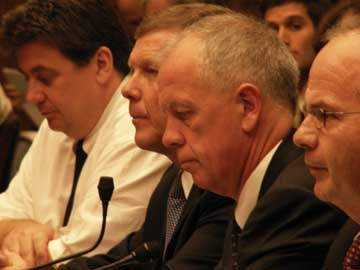|
Feature
ENERGY: ENERGY ECONOMICS
Global Supply and Demand: Q&A with John Felmy
Plus! The top energy news stories of 2006
 Despite lower gasoline prices this fall, prices of oil, natural gas and gasoline once again topped the energy debate this year, leading to questions of price-gouging and renewed calls for both conservation and further exploration. But as has been the case in recent years, this year’s prices of fossil fuels are due to simple economics. Prices are high when global supplies are tight and global demand high — driven in large part by ever-increasing demand from developing countries such as China and India — and prices are lower when supply is higher or demand is lower, as it was this fall. In September, Geotimes reporter Megan Sever talked with John Felmy, chief economist at the American Petroleum Institute, about the energy market over the last year.
Despite lower gasoline prices this fall, prices of oil, natural gas and gasoline once again topped the energy debate this year, leading to questions of price-gouging and renewed calls for both conservation and further exploration. But as has been the case in recent years, this year’s prices of fossil fuels are due to simple economics. Prices are high when global supplies are tight and global demand high — driven in large part by ever-increasing demand from developing countries such as China and India — and prices are lower when supply is higher or demand is lower, as it was this fall. In September, Geotimes reporter Megan Sever talked with John Felmy, chief economist at the American Petroleum Institute, about the energy market over the last year.
BP executives testified before Congress last fall, following a shutdown of oil production on Alaska’s North Slope. Earlier in the year, executives of several other major oil companies also testified before Congress over their record profits, and the question of whether or not they were fixing prices of gasoline and oil. Photograph is by Christine McCarty with the House Energy and Commerce Committee.
MS: What do you think is the most significant energy story of the year?
JF: Prices have continued to be a dominant story. What we’ve seen this year is a continuation of everything we’ve seen over the last four or five years. We’ve seen tight global markets for crude oil as supplies were disrupted in countries like Nigeria, Iraq and Venezuela. We’ve seen continued strong demand growth in developing countries like India and China. U.S. demand has been mixed this year — sometimes it was up, and sometimes it was down.
We have also seen really complicated changes in the gasoline and diesel fuel situation. That’s on top of the damage that we suffered from the hurricanes last year, when both offshore production and refineries were offline. All of these things came together to cause really high gasoline prices, record crude prices at least in nominal terms and a clear message that markets are tight.
Interestingly, this year, we have seen consumers begin to respond to high prices. [The response] has not been to the degree that we saw back in the early 1980s when consumers dramatically changed their usage patterns by switching to small cars and so on, but we’ve seen demand go down on some points.
MS: Could you elaborate on the consumer changes?
JF: We saw gas demand decline significantly prior to and after the summer months. During the summer months, consumers still appeared to be driving a lot, likely because driving is still the cheapest way to travel, especially with a family.
We have seen evidence of sport utility vehicle (SUV) sales declining noticeably, though not necessarily for the real expensive ones, but sales dropped considerably for the middle-range SUVs. On balance, what you saw was marginal demand change, but not as dramatic as we’ve seen in the past.
MS: What do you see going forward? Will we continue to see prices fall or remain low?
JF: Well, that’s a cloudy crystal ball, depending on what happens with Nigeria, Iraq, China, the weather, hurricanes, that kind of thing. A lot of questions remain. What are consumers going to do? Will we continue to see high levels of refinery activity like we’ve had, and high imports? So it’s sort of a function of all of those individual parameters that have come together, and it’s just really hard to say.
MS: What is the situation in Nigeria, Iraq and other countries?
JF: The issue in Iraq is security. It’s really hard to look for oil when people are shooting at you. So the key question is: When will we have the security situation improved so that people can go in there and develop the resource? The resource base is huge, but it’s going to require a lot of technology, a lot of money and a lot of effort to develop it.
The Nigeria situation is one of civil unrest. What needs to happen is to get all the parties there to agree on what needs to be done to develop the resource and share the revenue. It remains an unknown.
In Venezuela, [President Hugo] Chavez has laid down the gauntlet about what he thinks of the United States and about some of the foreign companies operating [in Venezuela]. It’s a viewpoint that is very unfortunate because the country has a lot of resources that could be developed. … Without knowing the rules of the game, it’s unclear how many foreign companies might be interested in going in there.
The situation in Libya, of course, is more positive. … We’ve already seen companies bidding [for leases] and looking for major development there, so that looks to be promising.
MS: Early this fall, BP temporarily shut down its production at America’s
largest oil field at Prudhoe Bay on Alaska’s North Slope, following
an oil spill earlier in the year and corrosion problems. Have we seen
any impacts from the BP shutdown?
JF: No, not really. The industry works very, very hard to have a lot of best practices procedures. The companies have a lot of performance assessments to look at what they’re doing and what other techniques they might need to employ. …
Initially, there were some short-term price fluctuations [in the oil market], when it looked like 400,000 barrels [per day] were going to be offline. That charged the markets a little bit, but they’ve since settled. And we’ve seen a decline in the price per barrel of oil.
MS: Early in the year, following announcements of oil companies’ record-high profits, Congress held hearings about price-gouging. How has that affected the market, prices and the public perception?
JF: Well, anytime politicians start taking a swipe at you, of course you suffer in the public eye. ... That’s unfortunate, because it’s just the markets at work. We haven’t found any evidence of price-gouging.
What’s more concerning to us is that some of this legislation that Congress is talking about could morph into price controls. … And that returns us to the bad old days of the 1970s, when price and allocation controls really quickly fouled up the marketplace and cost consumers a lot. We would hope going forward that Congress thinks very cautiously about what they’re trying to do. … They need to just let the markets work.
MS: I have heard that the United States has ramped up its oil and gas production this year. Is that true?
JF: No, that’s not really accurate. We’re still recovering from the loss in the Gulf of Mexico, and we’ve had some problems in Alaska … so in terms of oil, no, we haven’t increased production. But in terms of refinery activity, our refineries have been operating at record levels so far this year.
MS: What sort of message would you want to give to the American public and politicians regarding the current energy market?
JF: The message would be that we still have a lot to do. The energy bill that passed last year had significant implications for coal, renewables, electricity generation and transmission, and natural gas distribution, but very little for oil and gas production. We need more access to be able to develop these resources, and we need more improved energy efficiency. And, we need more infrastructure. Until we really have some help in terms of doing that, the markets are likely to continue the volatility we [have] experienced for the last five years.
Links:
"Tensions in Latin America energy
sector," Geotimes, December 2006
"BP woes continue," Geotimes,
December 2006

 Subscribe
Subscribe

